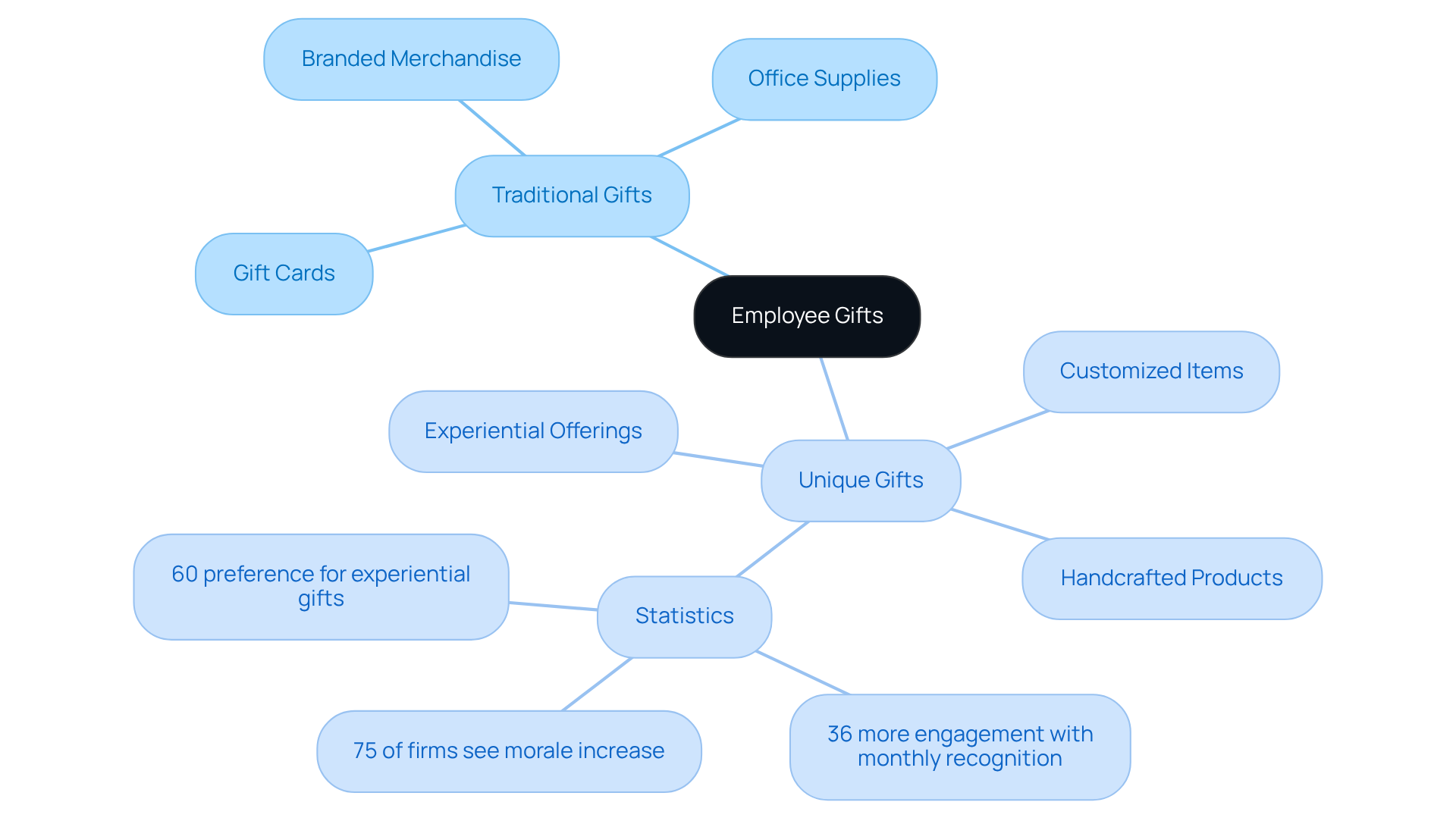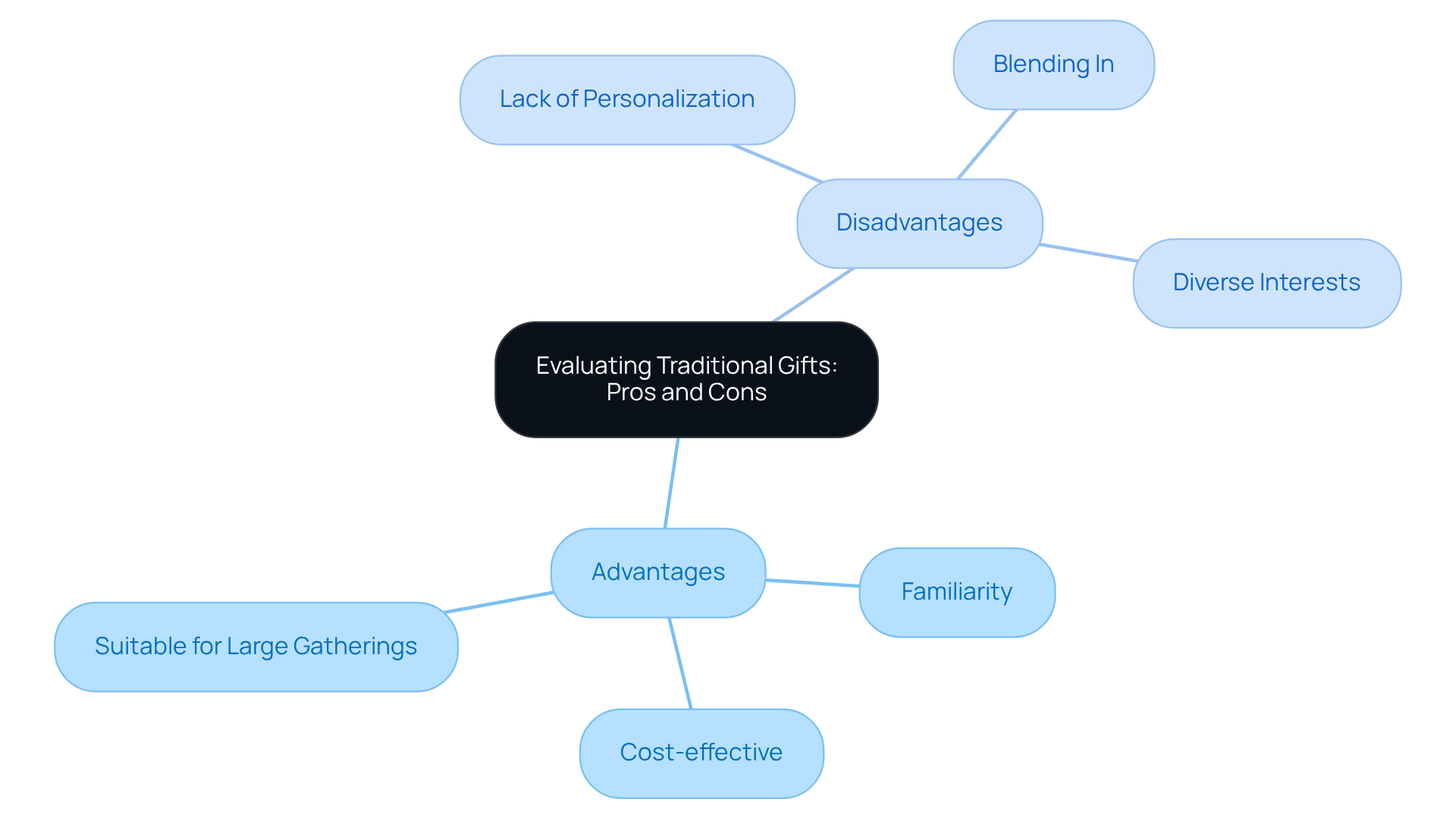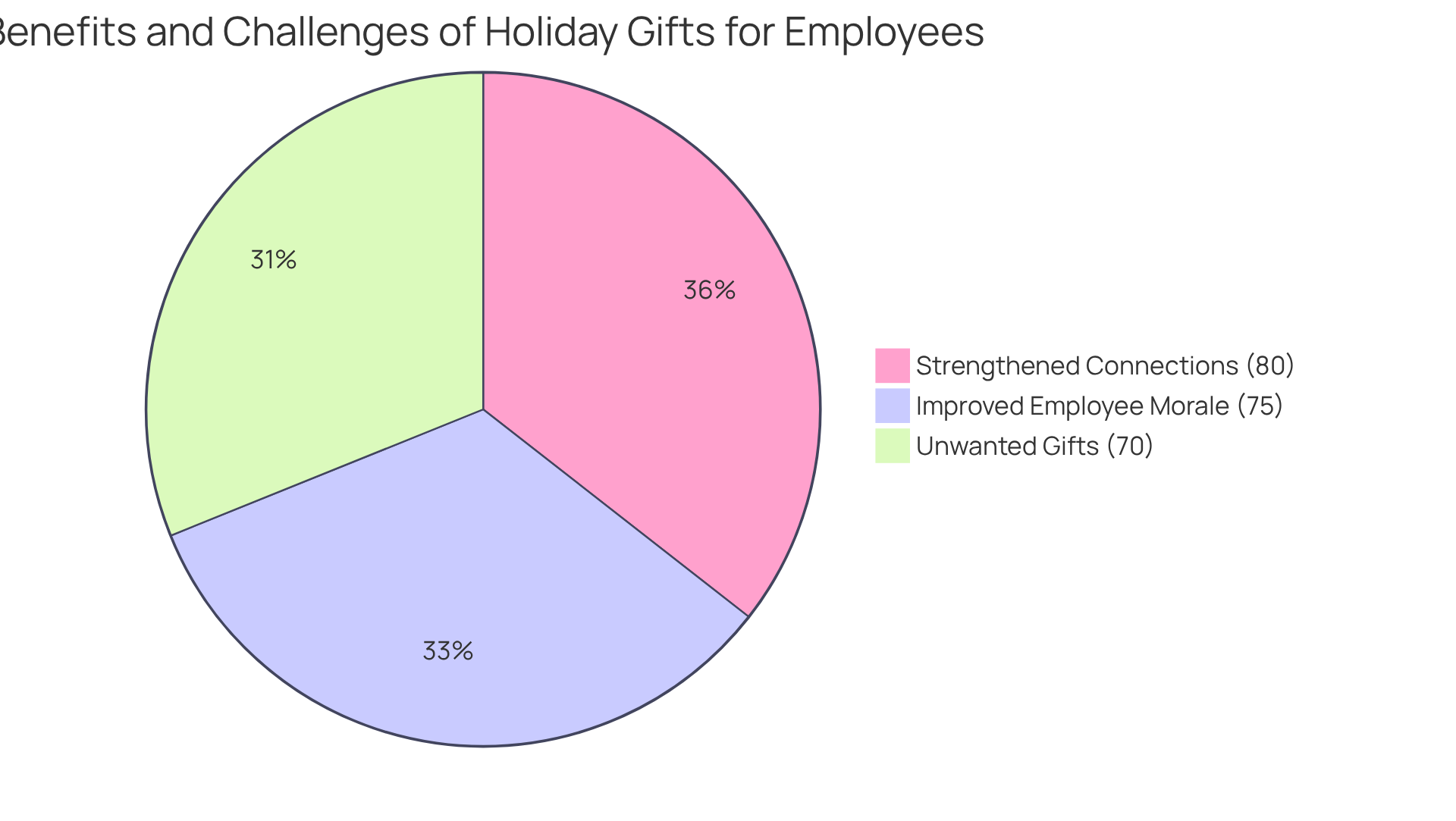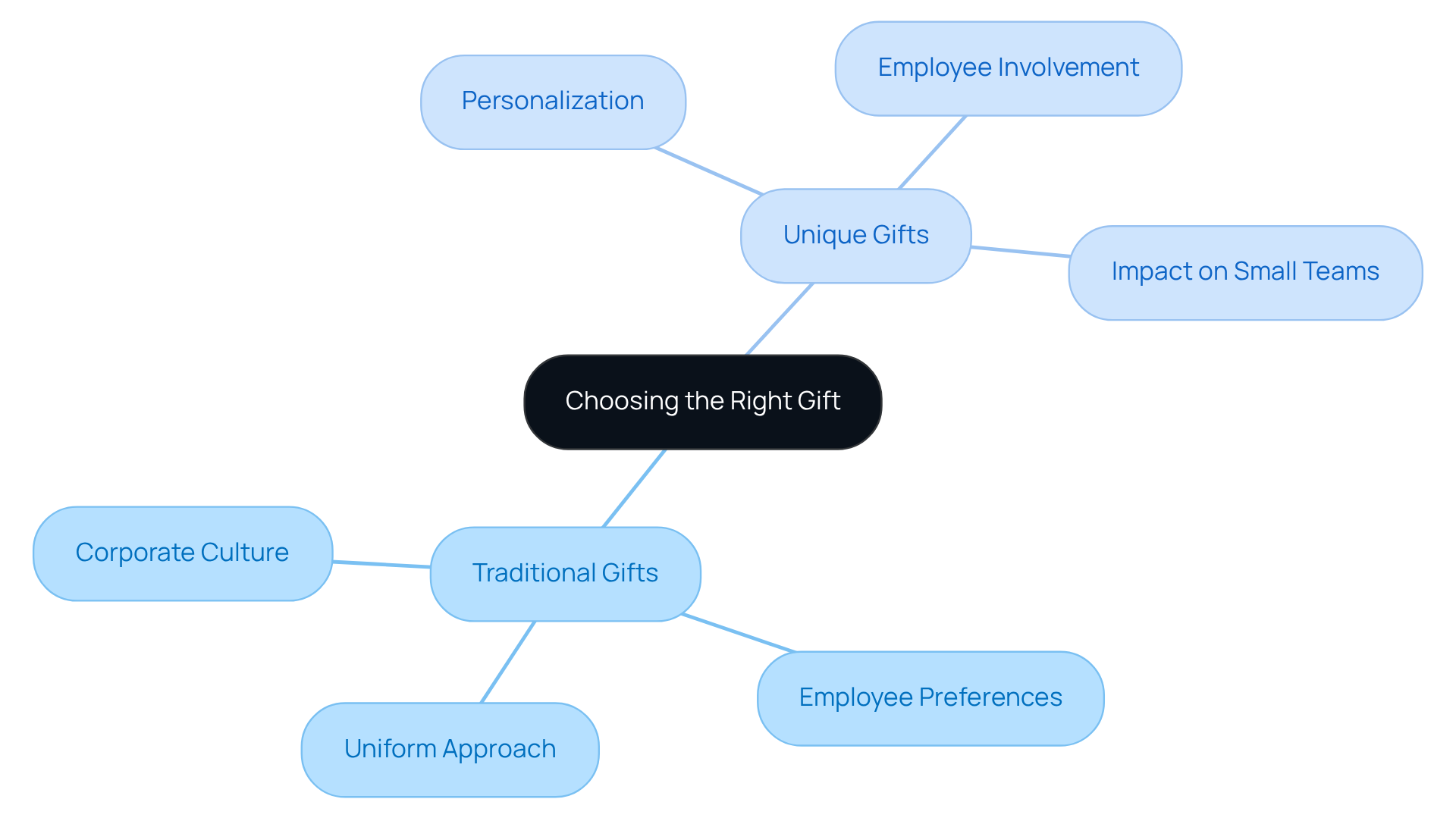Overview
The article emphasizes the significant differences between traditional and unique holiday gifts for employees, asserting that unique gifts cultivate deeper emotional connections and elevate employee morale. Research supports this assertion, demonstrating that personalized gifts result in heightened engagement and satisfaction. In contrast, traditional gifts often lack the personal touch that conveys to employees their value within the organization. By recognizing the profound impact of unique gifting, Corporate Gifting Managers can enhance their approach to employee recognition and motivation.
Introduction
The holiday season often ushers in a whirlwind of gift-giving, presenting a pivotal choice between traditional and unique gifts for employees—one that can profoundly influence workplace culture.
Conventional gifts, such as gift cards and branded merchandise, provide familiarity and convenience; however, they frequently lack the personal touch that cultivates genuine appreciation.
In contrast, unique gifts—spanning customized items to unforgettable experiences—forge deeper emotional connections and can significantly elevate employee morale.
Yet, organizations face a critical challenge: how can they harmonize the appeal of personalized gifts with the practicalities inherent in corporate gifting?
Defining Traditional and Unique Employee Gifts
Conventional holiday gifts for employees typically encompass items that are widely recognized and accepted, such as gift cards, company-branded merchandise, or standard office supplies. However, holiday gifts for employees often lack personalization and can be perceived as generic. In stark contrast, distinctive staff presents stand out due to their creativity and personal touch. Customized items, experiential offerings, or handcrafted products resonate deeply with individual team members' interests and values. Such unique holiday gifts for employees aim to cultivate memorable experiences and foster a stronger emotional connection between employers and staff, making employees feel genuinely valued and appreciated.
Research indicates that employees who receive acknowledgment at least monthly are 36% more likely to report higher levels of engagement and productivity compared to those who are recognized every three months. Furthermore, 75% of firms report an increase in staff morale from offering unique items, underscoring the positive impact of distinctive gifts on workplace culture. Additionally, 60% of employees express a preference for experiential gifts, highlighting their effectiveness and popularity in corporate gifting.
By investing in distinctive holiday gifts for employees that resonate on a personal level, companies can demonstrate sincere appreciation, ultimately contributing to a more positive workplace culture. This approach not only enhances employee satisfaction but also strengthens the overall organizational environment. Consider the transformative power of personalized rewards—your team deserves it.

Evaluating Traditional Gifts: Pros and Cons
The advantages of conventional presents lie in their familiarity and ease of selection, often accompanied by established expectations. They can be economical and suitable for large gatherings, making holiday gifts for employees accessible to ensure that each staff member receives a gift without necessitating significant customization.
However, the drawbacks are notable. A lack of personalization can lead to employees feeling undervalued or overlooked. Conventional gifts often fail to create a lasting impression, blending into the background of typical workplace offerings. Moreover, they may not cater to the diverse interests of staff, resulting in dissatisfaction among those who seek more thoughtful or unique options.
Research indicates that 54% of employees view holiday gifts for employees as symbols of gratitude from their employer, underscoring the importance of genuine acknowledgment. Additionally, employees recognized at least once a month are 36% more likely to report feeling engaged and productive compared to those acknowledged quarterly, highlighting the critical need for consistent appreciation.
In contrast, holiday gifts for employees, such as personalized items offered by Pangea Maps, can foster stronger emotional connections and enhance staff satisfaction, presenting a compelling alternative to conventional gifting methods. As noted by Meisha-ann Martin, when individuals feel acknowledged, they experience a sense of connection, further emphasizing the emotional impact of personalized gifts.

Assessing Unique Gifts: Advantages and Disadvantages
Distinct holiday gifts for employees offer considerable benefits by creating lasting experiences that personally connect with staff. These offerings often correspond with personal interests, causing recipients to feel acknowledged and appreciated. Research indicates that holiday gifts for employees can enhance workforce engagement and loyalty, reflecting a company's commitment to understanding and valuing its staff. For instance, 80% of businesses believe that holiday gifts for employees strengthen connections with employees and clients, while 75% report that these gifts improve employee morale. This underscores the positive impact personalized items have on workplace morale.
However, selecting distinctive presents comes with challenges. They typically incur higher costs and demand more time and effort to choose appropriately. Moreover, unique gifts may not be suitable for all corporate environments, particularly in conservative sectors where traditional items are favored. Notably, 70% of respondents in the 2023 Annual Holiday Gifting Report reported receiving items they did not use or desire, highlighting the potential misalignment with company culture or employee expectations. Therefore, while distinctive holiday gifts for employees can significantly enhance staff engagement, a thoughtful assessment is crucial to ensure they are well-received and appropriate for the context. As noted, "Expressing gratitude through gifting is essential for cultivating positive professional relationships and fostering staff engagement.

Choosing the Right Gift: Traditional vs. Unique for Corporate Needs
When selecting between conventional and distinctive holiday gifts for employees, companies must consider their corporate culture, employee preferences, and the message they aim to convey.
- Conventional presents often suit larger organizations with diverse staff groups, where a uniform approach is essential.
- Conversely, distinctive presents can create a more profound impact in smaller teams or organizations that prioritize personalization and employee involvement.
Ultimately, the right choice hinges on the specific context and objectives of the gifting initiative, ensuring that the selected gifts resonate with employees and reinforce a positive workplace culture.

Conclusion
Selecting the right holiday gifts for employees can significantly influence workplace morale and engagement. While traditional gifts offer familiarity and ease, they often lack the personal touch that makes employees feel truly valued. Unique gifts, however, provide an opportunity to foster deeper emotional connections, thereby enhancing the overall employee experience and satisfaction.
This article underscores the pros and cons of both gifting approaches. Traditional gifts may be more practical for larger organizations, yet they can leave employees feeling overlooked. In contrast, unique gifts, although potentially more costly and time-consuming to select, resonate on a personal level and are linked to higher employee morale and engagement. The statistics presented reveal the importance of thoughtful gifting, demonstrating that personalized items can lead to improved workplace dynamics and better employee retention.
Ultimately, the choice between traditional and unique gifts should align with the organizational culture and the specific needs of employees. Companies are encouraged to reflect on how their gifting strategies can enhance relationships and demonstrate genuine appreciation. By prioritizing thoughtful and personalized gifts, organizations can cultivate a more engaged and motivated workforce, paving the way for long-term success and a positive corporate environment.
Frequently Asked Questions
What are traditional employee gifts typically comprised of?
Traditional employee gifts usually include widely recognized items such as gift cards, company-branded merchandise, or standard office supplies.
What is the main drawback of conventional holiday gifts for employees?
The main drawback of conventional holiday gifts is that they often lack personalization and can be perceived as generic.
How do unique employee gifts differ from traditional gifts?
Unique employee gifts stand out due to their creativity and personal touch, often including customized items, experiential offerings, or handcrafted products that resonate with individual team members' interests and values.
What is the purpose of giving unique holiday gifts to employees?
The purpose of giving unique holiday gifts is to cultivate memorable experiences and foster a stronger emotional connection between employers and staff, making employees feel genuinely valued and appreciated.
What impact does employee recognition have on engagement and productivity?
Research indicates that employees who receive acknowledgment at least monthly are 36% more likely to report higher levels of engagement and productivity compared to those recognized every three months.
What percentage of firms report an increase in staff morale from offering unique gifts?
75% of firms report an increase in staff morale from offering unique items.
What type of gifts do 60% of employees prefer?
60% of employees express a preference for experiential gifts.
How can investing in distinctive holiday gifts benefit companies?
Investing in distinctive holiday gifts can demonstrate sincere appreciation, enhance employee satisfaction, and contribute to a more positive workplace culture, ultimately strengthening the overall organizational environment.


